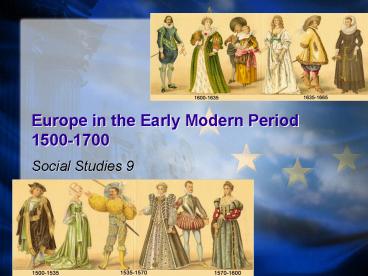Europe in the Early Modern Period 1500-1700 PowerPoint PPT Presentation
1 / 17
Title: Europe in the Early Modern Period 1500-1700
1
Europe in the Early Modern Period1500-1700
- Social Studies 9
2
(No Transcript)
3
European Social Order
- 900-1400 feudal system dominated Europe
- Serfs paid tribute to lords in exchange for
protection - C13th onwards, rental agreements replaced
feudalism - Black Death (1348-49) greatly reduced number of
workers
4
- Nobles gave land in exchange for workers
- Workers became landholders
- Return of population caused wages to fall
- Workers lost their land
5
Population Change 1500-1600
6
Population
- C16th dramatic pop. increase in Europe
- Before that time, epidemics and war had caused
pop. to fall - Crop failure caused diseases (plague, smallpox,
diphtheria etc.) to spread quickly - War led to deaths, major disruptions to crops and
plundering - War was nearly constant at some points
7
(No Transcript)
8
Economic Life
- In 1600, 75 of Europeans lived on farms
- Farming not very productive
- Great deal of uncertainty in daily life (disease,
war, taxes to pay, robbery) - Pop. growth caused people to move to less
productive lands - Men, women children forced to work for extra
earnings
9
- Poverty led to widespread deforestation
- Towns saw growth of merchant class
- Guild shops slowly replaced by capitalist
workshops - Urban poor became a growing problem
- Slavery widespread
- Overall, a time of economic growth
- Wealth concentrated in the hands of rich
10
(No Transcript)
11
(No Transcript)
12
Women The Economy
- Europe very patriarchal for long time
- C16th century, role of women started to be
limited - Until C15th, women allowed in guilds
- Job competition caused women to be excluded
- Women not allowed in universities
- Women lacked money need to enter trade
- Worked in hospitals, orphanages, as midwives and
servants
13
Role of the State
- By C17th, growth of divine right of kings
caused centralization of power - Led to powerful monarchs and nation-states
- Helped trade
- Monarchs and nobles sponsored voyages of trade
and exploration
14
Religion
- Middle Ages, Roman Catholic Church dominated
Europe - Church collected a lot of money
- Sometimes fought with monarchs
- C16th reaction against the Church
- Protestant Reformation reaction to perceived
flaws in Church - Led to intolerance major wars
- Strong missionary movements (Jesuits, Ursulines)
15
Culture Ideas
- Renaissance had started intellectual revolution
- Arts, writing, science experienced unprecedented
creativity - Time of inventions
- Military and commerce pushed on invention
- Improvements to ship building and navigation
(caravel ships mariner's astrolabe, quadrant)
16
(No Transcript)
17
Assignment
- Match each of these points with at least one of
the PIES categories - Write a paragraph
- Identify the most important social, political,
economic and intellectual factors that led to the
Age of Exploration in Europe

